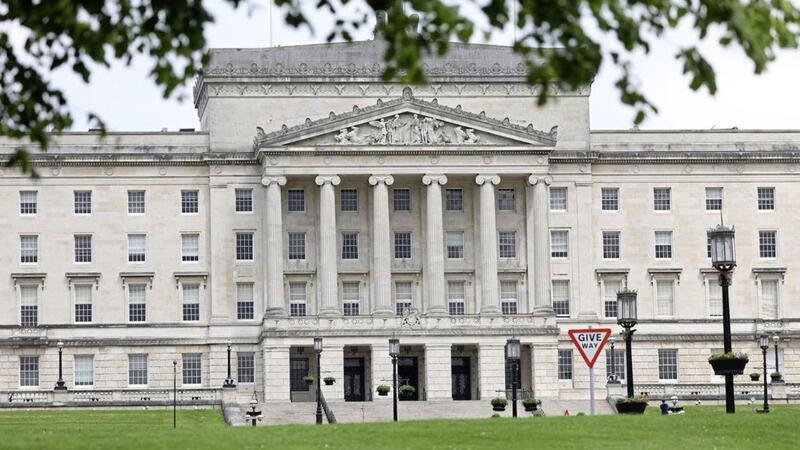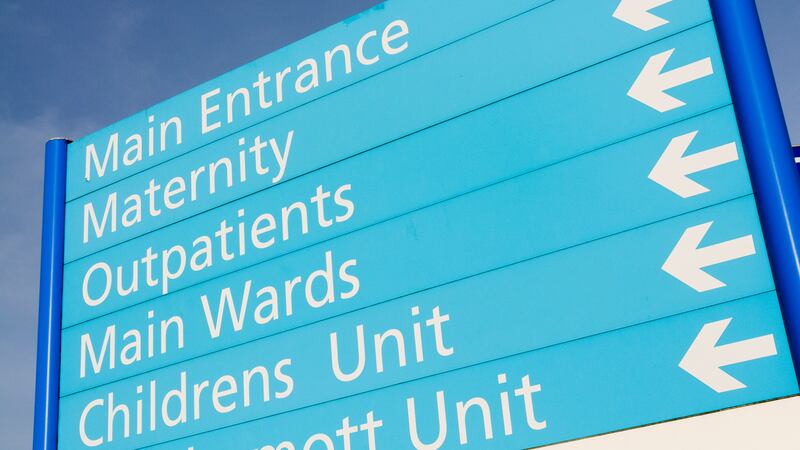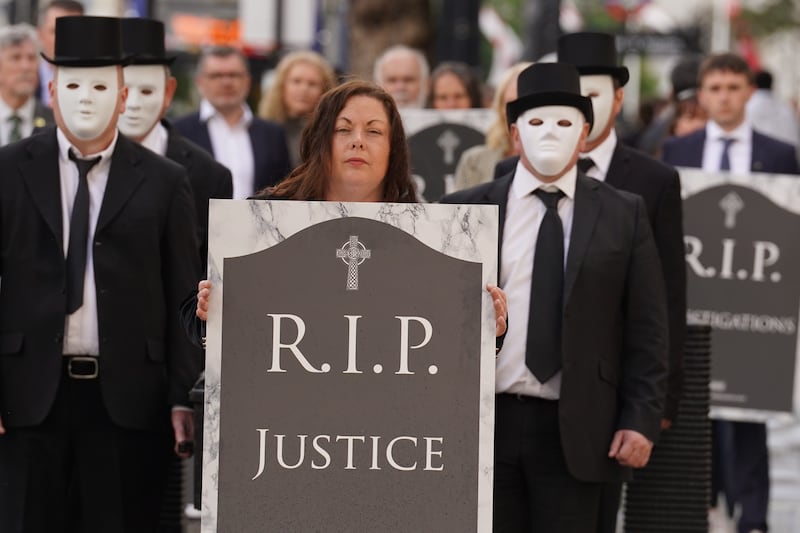The Assembly is to be recalled from summer recess to discuss plans by the Westminster Government to introduce a statute of limitations on Troubles prosecutions.
More than 30 MLAs have signed the recall petition and will meet on Tuesday July 20.
MLAs will debate a motion calling for victims and survivors to have a "full, material and central role and input into the content and design of structures to address the legacy of the past".
Party leaders met Secretary of State Brandon Lewis today about the amnesty he announced in Westminster earlier this week.
DUP leader Sir Jeffrey Donaldson said there were "robust conversations" in the meeting.
"It was a fairly robust conversation. Each of us outlined our views on the way forward in relation to legacy," he said.
Sir Jeffrey said any process for dealing with legacy had to be "victim focused".
"We want a process on legacy which includes an opportunity for those families and for those victims that want to take that route to pursue justice," he said.
"It is not just about truth, it is not just about information recovery, it is about having the opportunity for individuals and families to pursue justice for their loved ones.
"So, the secretary of state is reflecting on that, there will be further discussions over the summer period of legacy. We seek to try and get agreement on the way forward here, but I feel it is not just a question of what we the political parties want to see happening, but also this process must be victim focused.
"Victims should have their voice heard and the secretary of state has given a commitment that he will be reaching out to the representatives of victims to hear what they have to say.
"Time is of the essence here. Many of the victims, many of the survivors, are in their latter years, and with every year that passes evidence opportunities diminish, the prospect of prosecutions also diminishes. So we really need to get this right, but we also have to move forward quickly.
"We recognise that these are very difficult and sensitive matters.
"This morning I have been meeting with some of the groups here representing innocent victims from across Northern Ireland. They are very concerned by the Government's proposals for what they believe amounts to some form of amnesty.
"They believe passionately that the opportunity for victims and families to pursue justice should not be closed off and that view was replicated in the comments made by party leaders this morning."
Sir Jeffrey said Mr Lewis had insisted that political parties in the north must have an input into plans to deal with legacy.
"I think in fairness to the secretary of state, he is willing to listen to what the political parties have to say. He made clear that the parties must have a role and an input into designing the process that takes this forward.
"The parties are clear, they want a legacy process to include the opportunity for families, for individuals, to pursue justice.
"I think the secretary of state understands that so we will see in the discussions we will have in the weeks ahead where that will take us. The secretary of state is indicating a willingness not just to listen to political parties, but to listen to victims."
Alliance Party leader Naomi Long said her party would not "provide cover for anything" that amounts to an amnesty over Troubles prosecutions.
Ms Long said: "Alliance was clear with the governments today we will continue to engage in the legacy process in order to find a solution. But that solution needs to be based on the rule of law and due process.
"However, we will not provide cover for anything that amounts to an amnesty. I was clear in the meeting this process has to be centred on victims, who have been re-traumatised this week thanks to the actions of the UK government. Any suggestion their right to access justice as been denied will hurt them further.
"The prime minister has stated in blunt and callous terms we need to draw a line under this issue and move on.
"That is easy said for those who have not suffered any loss, but it is harder to do when you have to live with that loss and pain on a daily basis.
"It is imperative we restore the focus back to the needs of victims - this should not be simply a political discussion."
UUP leader Doug Beattie said today's meeting "did not provide any solutions for innocent victims".
Mr Beattie said: "I made clear at the meeting that we would not be supporting a statute of limitations, which has always been our consistent position because it was always going to inevitably lead to an amnesty for terrorists.
"The UK government must widen their proposals to incorporate a criminal justice element or they will risk inflicting more pain on innocent victims whose families have already sacrificed so much.
"Any proposals which snuff out any hope of justice need to be abandoned. The Irish government needs to do more than what they are doing now. It's not good enough that the Irish government comes to the table with warm smiles, but little else. Where is their command paper and what are they going to do?
"We need to widen the focus, we need to widen the lens and we need to look at both governments and their part within what happened here in Northern Ireland and further afield. Until we do that we will always be failing our victims and survivors."
Taoiseach Micheal Martin said that "unilateralism" does not work when implementing the terms of the Good Friday agreement.
Speaking in Dublin following his meeting with European Commission President Ursula von der Leyen, Mr Martin said: "There has to be a consensus-based approach and all of the parties in Northern Ireland are united in their opposition to the decision that has been taken," he added.
"I think the British government need to reflect on that and on the process.
"There has to be engagement and there has to be consensus building. We agreed a process to deal with this and it's through that process that very sensitive issues such as this should be resolved.
"What is at the foremost of our minds at all times must be the victims and their families.
"They feel betrayed and they feel let down, and we have to prioritise the families and victims of so many atrocities during that period of our history on this island, irrespective of one's community.
"It's very clear people want those that murdered their loved ones, be it paramilitaries, should be fully accountable to the justice system, fully acknowledging the challenges around that."
The taoiseach also said the EU has historically taken a "very positive approach" to peace on the island of Ireland.
"Indeed most recently in the financial package that we announced last year provided funding for the peace fund, generous funding which has to be matched by the Irish government, the British government and the Northern Ireland Executive," the Taoiseach added.
"It will provide hundreds of millions now when it all comes together to continue reconciliation projects, to fund economic projects in Northern Ireland and cross-border.
"The European Union has been a very positive, almost neutral player in terms of just wanting peace.
"In the context of the decision announced by the British government, that clearly is something that has to be dealt with in the context of the Good Friday Agreement."
Labour's shadow secretary of state Louise Haigh has said the British government must "think again" over its proposals for dealing with legacy in the north.
The Labour MP said: "It would be deeply divisive for ministers to press ahead with their cynical legacy proposals in the face of overwhelming opposition from victims, political parties and the Irish government.
"A legacy solution has to be done with the victims, people and communities of Northern Ireland - not to them.
"There must be a comprehensive legacy process as outlined at Stormont House, with families able to discover the truth, through effective investigations with full police powers.
"The prime minister has already caused deep hurt - he must think again."
Northern Ireland's Human Rights Chief Commissioner said the proposals raise "profound issues about the veracity of the rule of law".
Les Allamby said: "These proposals appear to disregard the requirements for an effective investigation under Article 2 of the European Convention on Human Rights. The decision to halt existing inquests and other civil actions also raises profound issues about the veracity of the rule of law.
"The Human Rights Commission has long advised that any legislation introduced by the UK Government regarding the investigation of violations and abuses of the right to life or freedom from torture, inhuman or degrading treatment that occurred during the conflict must not amount to a de facto amnesty.
"This includes any proposed introduction of a statute of limitations or other undue or insurmountable barriers to the prospect of prosecutions. Article 2 of the European Convention on Human Rights includes a requirement to ensure investigations which are thorough and secure meaningful accountability.
"We will scrutinise the proposals in full and will continue to advise the UK government of its obligations to all the victims of the conflict and their families.
"We want to ensure that legislation, and any resulting mechanisms to deal with addressing the past in Northern Ireland are fully compliant with domestic human rights law and international human rights standards."








